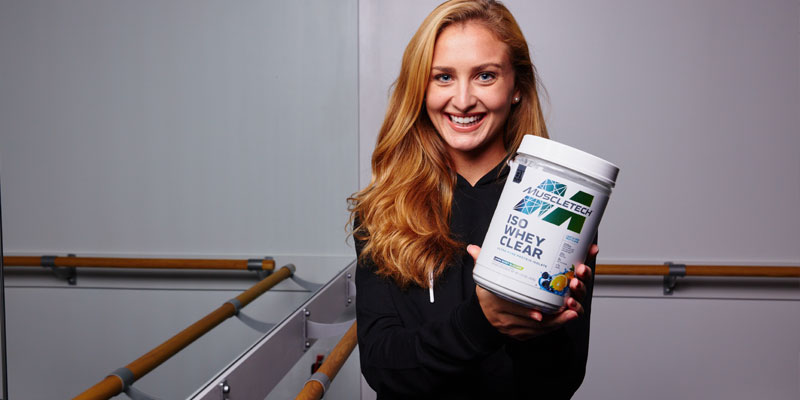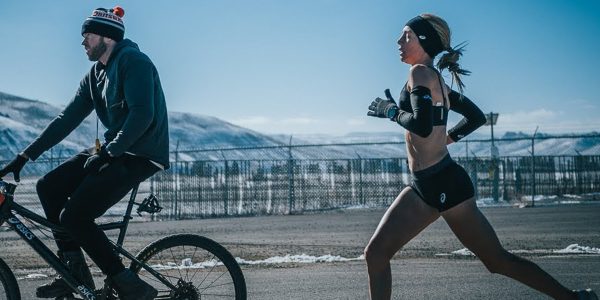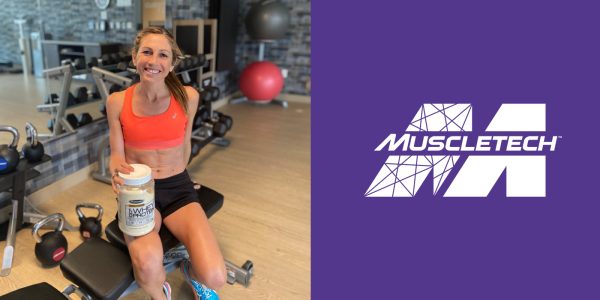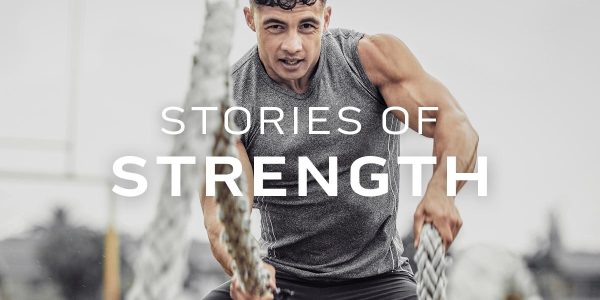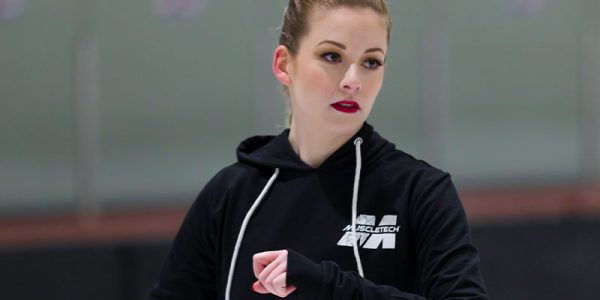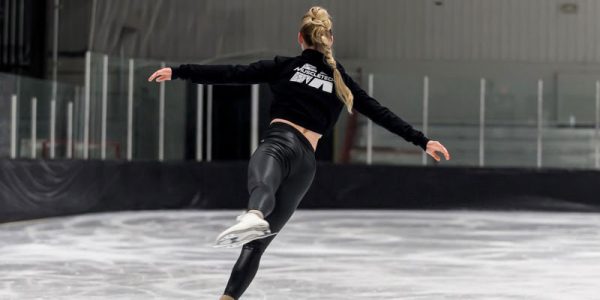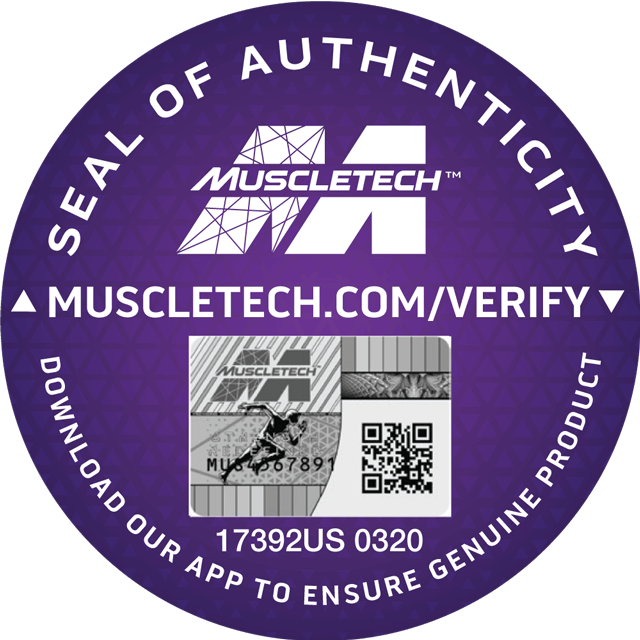Madeline Adams, a model, runner, and brand ambassador, is a proud new member of Team MuscleTech. The former Boston College Track & Field athlete made time to talk to MuscleTech about her 2016 ACC Cross Country Championships race that went viral, allowing herself to be vulnerable, the importance of goal setting, and why she wants to help women with their fitness journeys.
Q: A video of one of your college Track & Field meets in 2016 went viral with over 3 million views to date. The video shows you struggling to finish the race with 20 yards to go, but then something unexpected happens. Two of your opponents, Evie Tate and Rachel Pease, instead of running past you, stopped, placed your arms around their shoulders, and carried you to the finish line. In that moment, you must’ve been experiencing unbearable pain. Can you recall what was going through your mind during the race as you refused to give up, doing everything in your power to finish, even though your body was shutting down on you?
A: “That moment still makes me emotional in some regard because I, not to sound cliché, was truly running the race of my life. I was on track to run around 3 to 4 minutes of a PR, or personal record, over a 6K distance at the ACC Championships. I knew I was doing well. My coach was excited, I was excited, and I knew somehow I had moved up to be our fifth girl for Boston College. The first five girls in cross country score points for the team, so to score at a championship meet that large would’ve been a huge deal for me, and definitely a big moment in my career.
As I continued to move up throughout the race, I was just going off of pure adrenaline. It was a pretty hilly course, and we were also in North Carolina. So, it was very hot and humid, probably 85 degrees, and we had just come down from cold New England. All of us were trying to get adjusted to that and the finish was up a hill.
When I first went down, I didn’t understand what was going on. I didn’t know why I was on the ground. I obviously blacked out, fainted, and my legs just gave out. But then I came to really quickly, and was like, ‘Oh, no. Why am I on the ground? And I am so close to the finish line that I need to finish.’ I knew how well I was doing, and knew that I was in a point scoring position for my team. So, I just had to figure out a way to finish.
The video that went viral didn’t include me struggling for minutes before that. That was the craziest part. There were multiple attempts of me falling, getting back up, falling, running a little, falling, and getting back up. The video that went viral didn’t start until I was just on the ground. I didn’t know where to go from there. Eventually, I think I would’ve just started crawling. But that’s when Evie and Rachel came up.
It was just pure determination. There was something going through my brain like, ‘Although your legs aren’t working, you have got to get to the finish line because you’re in scoring contention for your team.’ I knew how well my team was doing and I knew I had to get to that finish line in some way, shape, or form. I also wanted to know my time because I was running the race of my life. It was just pure survival instinct kicking in. When your legs fail you, and all else fails you, you’ve just gotta get done what you set out to complete.”
Q: What did it mean to you after the race, once you were healthy and healed, to watch that video of yourself struggling and see opponents sacrifice their positions in the race to make sure you made it to the finish line?
A: “I was definitely in a lot of shock post-race. I didn’t even think for a second that the race was recorded, which it obviously was because my mom was watching from Boston. But I didn’t think for a second that the video would go anywhere.
At the moment, I don’t think I understood the weight of two opponents, two girls from totally different teams, not my team, making the decision to help me. It wasn’t until I got back to the hotel and one of my teammates had tagged me in an Instagram video, and it was that video. And I just thought to myself, ‘No way.’ I remember I just started crying – truly bawling my eyes out. I was just so emotional because of what they had decided to do to sacrifice their race for me. And also to see myself struggling like that made me incredibly emotional, knowing how great of a race I was having up until that very second, and I was just so painfully close to the finish line. I was so overwhelmed.
When we got back to Boston the next day, our trainer told me I had enzyme levels that were not safe and said I needed to drive myself to the hospital immediately. I remember going back to my off-campus apartment and I just started packing a bag. My roommates were like, ‘Where are you going?’ I said, ‘I’m driving myself to the hospital.’ I was in the hospital for many hours, and then I had news outlets waiting at my apartment after I got released.
I was in shock for days. I don’t think it was really until the interviews in the days following the race that I had a chance to reflect on what it had meant to me, and what they did for me as strangers, and competitors at that.”
Q: When people think about going viral, usually they think about making a funny video or something like that. Being the person who was helped across the finish line, as a competitor, why was it important for you to speak up and publicly thank them? There are probably people out there who would rather avoid that type of attention. So, why did you decide to face it head on?
A: “I really decided to speak up about it because I felt it was so important for our sport. Running can be a very individualistic sport in general, but there’s also that team aspect that we all love. But it can get a little competitive, even amongst your teammates. You can win a lot of accolades by yourself and go very far in this sport even without a team. So, I felt it was very important for the community, it was important for my college, and it was important for everything I stand for in my core values. I really believe it’s important to be a good sport.
Both of them won the NCAA’s Sportsmanship Award that year because of their acts of service. I think it would’ve been wrong for me to not speak up about it and say thank you. I reached out to them directly and sent messages to express my gratitude. But I thought for the sake of our sport and the running community, which at that point I had been a part of for over 10 years, I needed to say something. I needed to thank everyone that had gotten me there, and that had made that happen.
Without a doubt, it was a little tough because it was me failing, and failing in the public eye, nonetheless. It’s me really, really struggling. So, that’s why to this day it still makes me emotional to watch it because it was really hard to go through that moment, and then relive it so many times over, and over, and over again. But at the same time, I am so thankful that they did that for me and they really did not have to. It just spread an amazing message through our community. Sportsmanship is real, community is real, and people have big hearts and true compassion, even though they are your competitors. I thought it would be so against who I am not to highlight how amazing that experience was in my life.”
Q: Why is it so important to you to spread the message of good sportsmanship and community?
A: “I think spreading the message of community and good sportsmanship is so important because there’s a lot of negativity out in the world. Social media can be a toxic place. It can be a tough place where a lot of people are trying to seek approval all the time, or where people are trying to figure out where they fit in. And there’s nothing worse than having negativity in what you consider to be your community. I needed to shine a light on something that was just an amazing story that you don’t see very often because there is so much negativity out there.
It’s so easy to spread that negativity, especially when you’re competing against other people. It’s so easy to want to tear others down. There was never a moment when I said, ‘No, I won’t do that interview,’ or ‘I’m too overwhelmed,’ or ‘Sorry, I’m in the hospital.’ I was game for every single media outlet that approached me. I had to spread this message and I had to show everyone my gratitude.”
Q: That definitely had to take a lot of vulnerability on your part. We read a story that said that you didn’t become a model in college because modeling is a vulnerable career. After that experience, and putting yourself out there and being vulnerable, did it help make the decision to become a model easier for you, or maybe harder?
A: “My experience at the ACC Championships, and the post-media coverage, may have trained me subconsciously for the jump I was going to make into modeling, and truly putting myself out there two years later.
I sought out those opportunities throughout college so it wasn’t just necessarily that moment. I had joined a lot of different clubs outside of just running that I was passionate about – photography, yearbook club, mentorship programs, etc.
I think throughout college I consciously put myself in situations that were unfamiliar. I made myself vulnerable by jumping into things that I had no prior experience in. I think the accumulation of those experiences prepared me for what was going to be an incredibly vulnerable jump from photography into modeling after I graduated college.”
Q: Is being vulnerable something that comes naturally to you or is it a learned skill that you’re constantly working on?
A: “I think being vulnerable is a learned skill that I’m always working on. Even now, two years into modeling, I would be lying if I said there weren’t days where I second-guessed a post, or a story, or the way I said something, or the way I responded to someone. It’s an ongoing battle and we all sort of struggle with it. How vulnerable should you be to people who might not know you? But at the same time, it’s important to be super authentic because people really appreciate that. The nicest compliments I get are when some people I would consider strangers reach out to me and say, ‘The reason I love following you, and what I appreciate about you most is that you are so authentic and vulnerable with people.’ I don’t just show the glamorous side of life because not even a model is perfect 24/7 – not even close.
Honestly, I think quarantine helped. Not wearing makeup for so many months, and working remotely, you get really comfortable in your own skin and you start to appreciate your natural beauty a little bit more. It’s something you have to keep working on and I think having a great support group of people who applaud your vulnerability really helps.”
Q: Running Track & Field at Boston College you were able to improve each season and continually set Personal Records (PR). How has running influenced how you approach setting goals for yourself?
A: “Running has always been such a huge part of my life. The cool thing was I ran cross country, indoor track, and outdoor track so I had a lot of variety and could always set my sights on that next race, and that next distance. So, if I didn’t achieve my 3K PR goal for the season, maybe I took a couple of seconds off of my mile time, which was really fulfilling. It was slightly easier to keep yourself hungry for more because there was always another race, or another distance you could improve on.
Goal setting is always so important to really keep yourself humble, and to keep yourself on track day-to-day. When you can break down longer-term goals into smaller, more obtainable goals, it helps keep you motivated.
Now, with modeling, if there’s something I want to achieve, I’m going to write it down. And then, I’m going to figure out how I backtrack from there. It might be a big goal, and that’s OK. But how do I make smaller day-to-day goals, or week-to-week goals? Because sometimes I only have my weekends to do modeling and content creation. I come up with absolute, non-negotiable things that I need to accomplish each week because ultimately that’s going to get me somewhere bigger, somewhere closer to my larger goal.
Goal setting is absolutely a life skill, and running definitely helped with it. It continues to propel me with my modeling today because I have to keep myself focused week-to-week instead of just saying, ‘In 6 months, I want to achieve X.’ It’s really hard to keep yourself on track that way since time sort of starts to fly by as we’ve seen even just this year.”
Q: What was the first thing that went through your mind after learning you were chosen to join Team MuscleTech?
A: “When I first found out about becoming an ambassador for MuscleTech, I was definitely super excited. I’ve always been super passionate about health and wellness overall- but specifically- what that looks like for athletes post-college. I think that’s something I definitely struggled with – not having a coach every single day telling you what you have to do. I never had to put much thought into what I should do each day to stay in shape.
Post-college I’ve done a lot of self-discovery in terms of what that means for me. So, this partnership with MuscleTech is so exciting to me because I have a lot of fitness goals now that are a little trickier to obtain without having a coach. I think MuscleTech’s products are so awesome, especially since I want to stay super lean for modeling, but also build muscle in the right areas. I’ve been able to do that with the help of a lot of their products. Staying in my absolute peak shape is still something that’s my number one priority day-to-day.”
Q. You talked about your fitness self-discovery post-college. What lessons are you excited to share with others?
A: “There are plenty of women who were Division 1 athletes and now find it really tricky to sustain, and also to build muscle, because you don’t have the same resources that you once did.
I think people forget that if you’re not supplementing yourself with protein, you are never going to get to where you want to go as quickly because you need that protein in order to build muscle. I think females especially can be scared to gain muscle because they think that’s going to equate to bulking and gaining a lot of weight – and that’s really not the case. I definitely think I’m living proof of that. You can really tailor MuscleTech’s products to your specific needs. So, I’m really excited to help people on their fitness journeys and figure out what makes sense for them. I think this partnership is going to help me connect with people on a different level and help them get back to their peak shape.”

